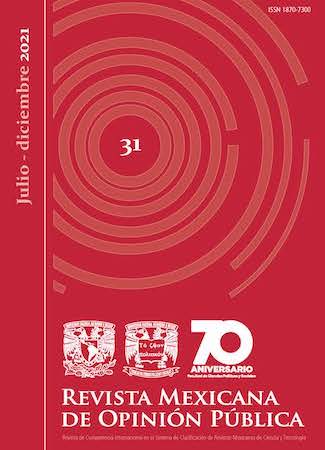Evaluación de los candidatos políticos por estudiantes mexicanos de Puebla en el año 2019
Contenido principal del artículo
Resumen
El resultado de la elección mexicana ocurrida en 2018 genera dudas sobre algunos elementos de teorías políticas clásicas, principalmente del enfoque sociológico y del modelo Michigan. De este último, hay cuestionamientos en lo referente al papel de los partidos. Pareciera que la ciudadanía mexicana ahora se guía más por quiénes son los candidatos que los partidos, por lo que se investigó qué rasgos de los primeros determinan la preferencia electoral. Se realizó una encuesta aprovechando la elección de gobernador en Puebla en el año 2019. Se trata de un trabajo de limitada representatividad, pero en los datos no se encontró una relación relevante entre el partido y la preferencia electoral; en cambio, se halló que rasgos pragmáticos y —sobre todo— morales de los candidatos sí se relacionan con el voto. Esta prioridad de los candidatos sobre los partidos parece oponerse al acento que el modelo Michigan pone en los segundos, pero —interesantemente— no apunta de forma directa hacia un enfoque racional, aun cuando éste ha ponderado constantemente a los candidatos por encima de los partidos. A largo plazo sería productivo probar estas conclusiones en una elección nacional con una muestra mucho mayor.
Detalles del artículo
Citas en Dimensions Service
Citas
BEAN, Clive y MUGHAN, Anthony, “Leadership Effects in Parliamentary Elections in Australia and Britain”, The American Political Science Review, vol. 83, núm. 4, American Political Science Association, Cambridge, Nueva York, EE. UU., 1989, pp. 1165-1179.
Benemérita Universidad Autónoma de Puebla, “Anuario estadístico 2018-2019”, Benemérita Universidad Autónoma de Puebla, Puebla, México. Disponible en <https://pdi.buap.mx/sites/default/files/2019/anuario%2018-19.pdf>, [fecha de consulta: 21 de noviembre, 2020].
BOLÍVAR MEZA, Rosendo, “Desdibujamiento ideológico y pragmatismo. MORENA en la coalición Juntos Haremos Historia, durante el proceso electoral de 2018”, Revista Mexicana de Opinión Pública, núm. 27, Universidad Nacional Autónoma de México-Facultad de Ciencias Políticas y Sociales, Ciudad de México, México, 2019, pp. 61-76. Disponible en <http://www.revistas.unam.mx/index.php/rmop/article/view/65654>, DOI: http://dx.doi.org/10.22201/fcpys.24484911e.2019.27.65654, [fecha de consulta: 21 de octubre, 2019].
CAMPBELL, Angus, CONVERSE, Philip, MILLER, Warren y STROKES, Donald, The American Voter, Wiley, Nueva York, EE. UU., 1960.
DOWNS, Anthony, An Economic Theory of Democracy, Harper and Brothers, Nueva York, EE. UU., 1957.
GÓMEZ TAGLE, Silvia y VALDÉS, María Eugenia (cords.), La geografía del poder y las elecciones en México, Plaza y Valdés, D. F., México, 2000.
GUARDADO RODRÍGUEZ, Jenny, “La identidad partidista en México. Las dimensiones políticas de la competencia en las elecciones presidenciales de 2000 y 2006”, Política y Gobierno, vol. temático, núm. 1, Centro de Investigación y Docencia Económicas, D. F., México, 2009, pp. 137-175.
GUTIÉRREZ SÁNCHEZ, Héctor, “La demanda moral hacia los políticos”, Espiral. Estudios sobre Estado y Sociedad, vol. 26, núm. 76, Universidad de Guadalajara, Guadalajara, México, 2019, pp. 233-272. Disponible en <http://www.espiral.cucsh.udg.mx/index.php/EEES/article/view/7097>, DOI: https://doi.org/10.32870/eees.v26i76.7097, [fecha de consulta: 22 de octubre, 2019 ].
KING, David y MATLAND, Richard, “Sex and the Grand Old Party”, American Politics Research, vol. 31, núm. 6, SAGE, Nueva York, EE. UU., 1980, pp. 595-612.
KORSTANJE, Maximiliano y ROBIN, Corey, El miedo: historia de una idea política, Fondo de Cultura Económica, D. F., México, 2009.
KUSCHICK RAMOS, Murilo, “Pronóstico electoral para el Distrito Federal en la elección de 2012”, Revista Mexicana de Opinión Pública, núm. 12, Universidad Nacional Autónoma de México, D. F., México, 2012, pp. 127-145.
MARKUS, Gregory B., “Political Attitudes During an Election Year: A Report on the 1980 NES Panel Study”, The American Political Science Review, vol. 76, núm. 3, The American Political Science Association, Cambridge, EE. UU., 1982, pp. 538-560.
MEROLLA, Jennifer y ZECHMEISTER, Elizabeth J., “Las percepciones de liderazgo en el contexto de las elecciones mexicanas de 2006”, Política y Gobierno, vol. temático, núm. 1, Centro de Investigaciones y Docencia Económicas, D. F., México, 2009, pp. 41-81.
MILLER, Arthur, WATTENBERG, Martin y MALANCHUK, Oksana, “Schematic Assessments of Presidential Candidates”, Political Science Publications, núm. 80, vol. 2, The American Political Science Association, Cambridge, EE. UU., 1986, pp. 521-540. Disponible en <https://www.cambridge.org/core/journals/american-political-science-review/article/abs/schematic-assessments-of-presidential-candidates/09ADAD4F330609E2B185D29461004293>, DOI: https://doi.org/10.2307/1958272, [fecha de consulta: 5 de octubre, 2019].
MORALES GARZA, Martha Gloria y FERNÁNDEZ GARCÍA, Luis Alberto, “¿Por qué ganó López Obrador?”, en MORALES GARZA, Martha Gloria y FERNÁNDEZ GARCÍA, Luis Alberto (coords.), Electores 2.0 y partidos viejos. Las elecciones mexicanas de 2018, Instituto Nacional Electoral, Universidad Autónoma de Querétaro, Querétaro, México, 2019, pp. 15-52.
MORENO, Alejandro, El cambio electoral. Votantes, encuestas y democracia en México, Fondo de Cultura Económica, Ciudad de México, México, 2018.
MORENO, Alejandro, La decisión electoral. Votantes, partidos y democracia en México, Porrúa, D. F., México, 2009.
MORENO, Alejandro y MÉNDEZ, Patricia, “La identificación partidista en las elecciones presidenciales de 2000 y 2006 en México”, Política y Gobierno, vol. 14, núm. 1, Centro de Investigación y Docencia Económicas, D. F., México, 2007, pp. 43-75.
RICO, Guillem, Líderes políticos, opinión pública y comportamiento electoral en España, Centro de Investigaciones Sociológicas, Madrid, España, 2009.
RODRÍGUEZ GARCÍA, Arturo, “Para el servicio público se necesita 99 % de honestidad y 1 % de capacidad, dice AMLO”, Proceso, México, 13 de agosto, 2019. Disponible en <https://www.proceso.com.mx/595958/para-el-servicio-publico-se-necesita-99-de-honestidad-y-1-de-capacidad-dice-amlo>, [fecha de consulta: 17 de septiembre, 2019].
SARTORI, Giovanni, Partidos y sistemas de partidos, Alianza, Madrid, España, 1980.
SHAWN, Rosenberg, BOHAN, Lisa, MCCAFFERTY, Patrick y HARRIS, Kevin, “The Image and the Vote: The Effect of Candidate Presentation on Voter Preference”, American Journal of Political Science, vol. 30, núm. 1, Midwest Political Science Association, EE. UU., 1986, pp. 108-127.
VALDEZ ZEPEDA, Andrés, “El miedo y la ira como estrategia en las campañas electorales”, Reflexión política, vol. 14, núm. 27, Universidad Autónoma de Bucaramanga, Bucaramanga, Colombia, 2012, pp. 134-140.
VALDEZ ZEPEDA, Andrés, HUERTA FRANCO, Delia A., PÉREZ PRECIADO, Octavio A., “El miedo como estrategia ‘ganadora’: el caso de la elección presidencial en México, 2006”, Revista de Ciencias Sociales, vol. 3, núm. 145, Universidad de Costa Rica, San José, Costa Rica, 2014, pp. 133-146.

Revista Mexicana de Opinión Pública por Universidad Nacional Autónoma de México se distribuye bajo una Licencia Creative Commons Atribución-NoComercial-SinDerivar 4.0 Internacional.
Basada en una obra en http://revistas.unam.mx/index.php/rmop.
